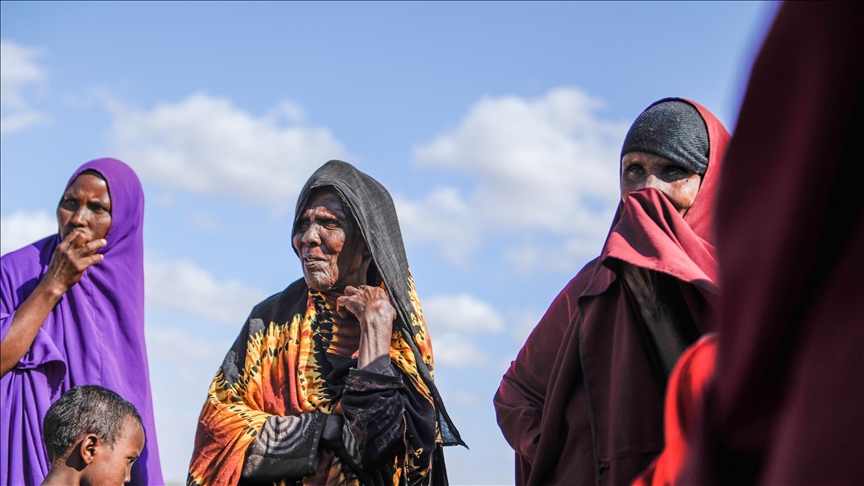Women in Ethiopia’s Tigray rally for food aid, justice
Protesting women take to streets, demanding resumption of food aid, return of internally displaced persons, end to sexual violence
 File Photo
File Photo
TIGRAY, Ethiopia
Women in the war-torn region of Tigray in Northern Ethiopia took to the streets on Sunday and continued their protests on Monday, demanding the immediate resumption of crucial food aid, the return of internally displaced persons (IDPs) to their homes, and justice for survivors of sexual violence.
The determined women raised their voices for an end to the crippling food shortages plaguing the region due to the halt in food aid by international organizations.
The protests erupted in various towns across Tigray, with the capital city of Mekelle witnessing a significant turnout.
The demonstrators, consisting mainly of women, held placards and banners, rallying for justice and change.
They voiced their concerns over the halt in food aid by international organizations, including the World Food Programme (WFP) and the United States Agency for International Development (USAID), which has left the region grappling with severe food shortages.
Hirut Mengistu, a protester, told Anadolu: “We cannot remain silent any longer! Our people are starving, our children are suffering, and justice seems like a distant dream.”
"We demand the immediate resumption of food aid and the return of our IDPs to their homes. How can we bear witness to such suffering and not take action?"
Serawit Gebremichael, a mother with a voice trembling with raw emotion, pleaded for help on behalf of countless others. "I am a mother. My children are hungry, and I can no longer provide for them," she said while talking to Anadolu.
"We need the world to hear our cries, to see our desperation. We are on the brink of starvation, and our lives are hanging by a thread. We implore the international community to intervene and save us from this unimaginable suffering."
Sexual violence
Abeba Haileslassie, the head of the Tigray Women Association, noted that the protests will continue until their grievances are addressed.
Demonstrations echoed across various locations in Tigray – Adigudem in the northeast, Mokoni in southern Tigrai, Shire in northwestern Tigrai, Axum in central Tigrai, Maichew in eastern Tigrai, and Adigrat in eastern Tigrai.
The protesters also demanded an end to the prevailing sexual violence against Tigraian women, particularly in areas occupied by Eritrean and Amhara forces.
The demonstrators also highlighted the dire shortage of essential medicines, exacerbating the already dire humanitarian crisis.
Tigray interim leader Getachew Reda says that he has held talks with the UN's WFP in Ethiopia to have food aid programs restarted.
A local leader in Tigray, Alem Gebrehiwot, expressed solidarity with the women protesters and IDPs, acknowledging the gravity of the situation.
“The voices of these brave women and the displaced population must be heard. We stand with them in their pursuit of justice, the resumption of aid, and the right to live in peace," Gebrehiwot told Anadolu.
Battle against starvation
During a visit to the Qoloji IDP camp, the largest camp in Ethiopia housing over 100,000 displaced individuals, Anadolu had the opportunity to witness firsthand the dire conditions faced by those affected by the conflict.
The camp was congested, with makeshift shelters housing displaced families having no proper sanitation facilities and limited access to clean water.
The recent halt in food aid by the WFP has further exacerbated their already desperate situation.
Two women, Zewditu Tesfaye, a small businesswoman, and Aster Demisse, a trader, shared their personal experiences with Anadolu and talked about the impact of the food aid cut.
Tesfaye, visibly distressed, explained how the lack of food aid has affected not only the IDPs but also the regular people who depended on it for their survival.
"The absence of food aid has led to skyrocketing prices locally, making it impossible for many of us to feed our families. We have no money, everything we had was looted or stolen when we were displaced," she lamented.
Demisse, who used to run a thriving business, now finds herself struggling to make ends meet.
She highlighted the plight of the most vulnerable people in the camp, saying: "Children, pregnant women, and the elderly are particularly suffering. We need immediate assistance to prevent further loss of lives due to hunger."
Rahel Gebre, a 35-year-old farmer, described the desperation and starvation that has plagued the camp since May.
"We have not seen any food aid since May, and our children are starving. The overcrowded conditions in the camp make it even more challenging for us to survive," she told Anadolu.
Anadolu Agency website contains only a portion of the news stories offered to subscribers in the AA News Broadcasting System (HAS), and in summarized form. Please contact us for subscription options.

